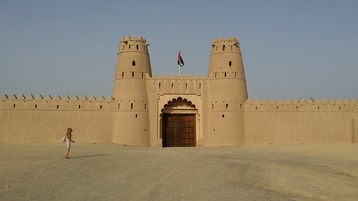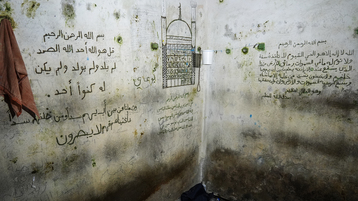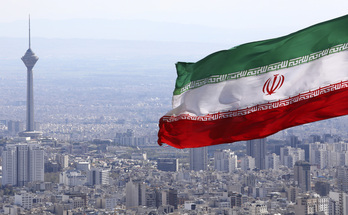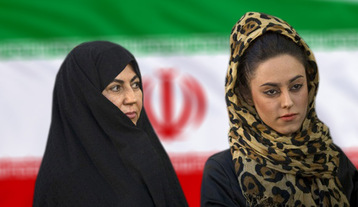-
The Syrian & Algerian regimes ... Two sides of the same coin

Arab regimes did not like the Arab Spring. Some of them dealt with it as a fait accompli, and others tried to keep it away so that the ruling class can keep its power and riches.
Since then, the Algerian regime has been taking precautions in case the Arab Spring came to Algeria which is drowning in corruption and whose wealth was stolen by its regime figures as Algeria is one of the biggest gas and oil exporters. Moreover, Algeria has been among the most corrupt Arab countries since the Arab Spring along with Syria, Somalia, Iraq and Libya.
After the fall of the oil price in 2014, Algeria experienced years of budget constraints and a currency crisis followed by national protests known as Hirak. In 2019, other protests sparked and made the army oust President Abdelaziz Bouteflika, in April 2019. However, the military generals still rule Algeria even after Abdelmadjid Tebboune assumed the presidency after Bouteflika as he is imposing the tyranny and police state he inherited from Bouteflika.
The Algerian regime did not only suppress the protest movement but also stood by the Syrian regime since the beginning of the Syrian revolution as it was against suspending the Syrian regime's membership in the Arab League Council in November 2011.
Unlimited support for the al-Assad regime
A Western diplomat, who preferred to remain anonymous, told Levant News that: "Algeria has not stopped supporting Bashar al-Assad's regime in Syria, and providing it with oil and energy sources since the beginning of the uprising in Syria until this day. Algeria is doing its best to restore the Syrian regime's relations with the Turkish government." He noted that President Tebboune's regime is trying to float al-Assad after all his killing and displacement of the Syrian people.

The Algerian dissident and head of the human rights organisation Shuaa, Rachid Aouine, said in an interview with Levant News that the Algerian regime has always been opposed to any change in the Arab region, especially Syria. "Instead of prosecuting those who murdered and betrayed the Algerians, such as General Mohamed Mediène, the former director of intelligence and also the former Defense Minister Khaled Nezzar, the military ruling class in Algeria along with the President honoured and awarded them on July 4 with the highest honours," he said. "The Algerian regime supports Bashar al-Assad's regime because it wants to prevent any change in the countries where the Arab Spring sparked. The Algerian generals do not only do this to Syria, but also they had a role in undermining the democracy in Tunisia as one of the Tunisian presidents told me after the revolution."
Alignment with Russia
Rachid Aouine said that After the Russian invasion of Ukraine, it became clear that Algeria chose to align with Russia and that is why Algeria demands the return of the Syrian regime to the Arab League, and Bashar al-Assad said that Algeria is the closest to us in the Arab world. However, the difficulties Algeria is going through are the best conditions for the military ruling class, which is made up of a diverse group of military personnel, secret service activists and elderly politicians, to impose its control.
Until recently, the Algerian Foreign Minister, Ramtane Lamamra, was visiting Damascus and providing support to the Syrian regime, in an attempt to float it and persuade Arab governments to accept Bashar al-Assad's attendance at the Arab summit, which is to be held in the Algerian capital in November.
Even before the conflict in Ukraine began, the Algerian regime seemed concerned that the rising global inflation, especially in food prices, might spark a new wave of protests all over the country.
In mid-February, President Tebboune issued a surprising announcement saying that Tax increases on some food products that were included in the 2022 budget will be frozen.
Besides raising the cash money the Alegrian treasury needs, the war in Ukraine has also raised the country's diplomatic status. On the other hand, the ambiguous way the old military generals deal with foreign powers and their inability to implement economic and political reforms have established Algeria's reputation as a kind of pariah state, despite its importance as an energy producer and its strategic importance in dealing with the instability in the Sahel region.
Intelligence crisis in the Algerian intelligence service
The human rights activist, Anwar Malek, previously revealed in his programme on his YouTube channel that there are major conflicts within the Algerian intelligence service, there is no coordination on several issues and there is an internal struggle between the officials to have the sensitive issues for themselves to deal with.
"President Abdelmadjid Tebboune and Lieutenant-General Saïd Chengriha, Chief of Staff of the People's National Army, launched an initiative to contain differences and bring the security apparatus together to thwart. The security conflict lies between the Internal Security Agency and leaders in the army and the old military," he added, quoting his own sources in Algeria
President Tebboune takes into account the interests of both sides and raises the ranks of the influential people in the intelligence apparatus to have them for his side. Malik showed how much big the conflict between the parties is and which could be directly reflected on the Algerian president because of his iron grip on security. He also talked about the role played by the Algerian intelligence in running after the opponents of the regime abroad and killing some of them to make them not participate in Algerian political life. Malik adds that Tebboune is interested in maintaining internal security and protecting himself from any threats that might come from his opponents abroad.
You May Also Like
Popular Posts
Caricature
BENEFIT AGM approves 10%...
- March 27, 2025
BENEFIT, the Kingdom’s innovator and leading company in Fintech and electronic financial transactions service, held its Annual General Meeting (AGM) at the company’s headquarters in the Seef District.
During the meeting, shareholders approved all items listed on the agenda, including the ratification of the minutes of the previous AGM held on 26 March 2024. The session reviewed and approved the Board’s Annual Report on the company’s activities and financial performance for the fiscal year ended 31 December 2024, and the shareholders expressed their satisfaction with the company’s operational and financial results during the reporting period.
The meeting also reviewed the Independent External Auditor’s Report on the company’s consolidated financial statements for the year ended 31 December 2024. Subsequently, the shareholders approved the audited financial statements for the fiscal year. Based on the Board’s recommendation, the shareholders approved the distribution of a cash dividend equivalent to 10% of the paid-up share capital.
Furthermore, the shareholders endorsed the allocation of a total amount of BD 172,500 as remuneration to the members of the Board for the year ended 31 December 2024, subject to prior clearance by related authorities.
The extension of the current composition of the Board was approved, which includes ten members and one CBB observer, for a further six-month term, expiring in September 2025, pending no objection from the CBB.
The meeting reviewed and approved the Corporate Governance Report for 2024, which affirmed the company’s full compliance with the corporate governance directives issued by the CBB and other applicable regulatory frameworks. The AGM absolved the Board Members of liability for any of their actions during the year ending on 31st December 2024, in accordance with the Commercial Companies Law.
In alignment with regulatory requirements, the session approved the reappointment of Ernst & Young (EY) as the company’s External Auditors for the fiscal year 2025, covering both the parent company and its subsidiaries—Sinnad and Bahrain FinTech Bay. The Board was authorised to determine the external auditors’ professional fees, subject to approval from the CBB, and the meeting concluded with a discussion of any additional issues as per Article (207) of the Commercial Companies Law.
Speaking on the company’s performance, Mr. Mohamed Al Bastaki, Chairman BENEFIT , stated: “In terms of the financial results for 2024, I am pleased to say that the year gone by has also been proved to be a success in delivering tangible results. Growth rate for 2024 was 19 per cent. Revenue for the year was BD 17 M (US$ 45.3 Million) and net profit was 2 Million ($ 5.3 Million).
Mr. Al Bastaki also announced that the Board had formally adopted a new three-year strategic roadmap to commence in 2025. The strategy encompasses a phased international expansion, optimisation of internal operations, enhanced revenue diversification, long-term sustainability initiatives, and the advancement of innovation and digital transformation initiatives across all service lines.
“I extend my sincere appreciation to the CBB for its continued support of BENEFIT and its pivotal role in fostering a stable and progressive regulatory environment for the Kingdom’s banking and financial sector—an environment that has significantly reinforced Bahrain’s standing as a leading financial hub in the region,” said Mr. Al Bastaki. “I would also like to thank our partner banks and valued customers for their trust, and our shareholders for their ongoing encouragement. The achievements of 2024 set a strong precedent, and I am confident they will serve as a foundation for yet another successful and impactful year ahead.”
Chief Executive of BENEFIT; Mr. Abdulwahed AlJanahi commented, “The year 2024 represented another pivotal chapter in BENEFIT ’s evolution. We achieved substantial progress in advancing our digital strategy across multiple sectors, while reinforcing our long-term commitment to the development of Bahrain’s financial services and payments landscape. Throughout the year, we remained firmly aligned with our objective of delivering measurable value to our shareholders, strategic partners, and customers. At the same time, we continued to play an active role in enabling Bahrain’s digital economy by introducing innovative solutions and service enhancements that directly address market needs and future opportunities.”
Mr. AlJanahi affirmed that BENEFIT has successfully developed a robust and well-integrated payment network that connects individuals and businesses across Bahrain, accelerating the adoption of emerging technologies in the banking and financial services sector and reinforcing Bahrain’s position as a growing fintech hub, and added, “Our achievements of the past year reflect a long-term vision to establish a resilient electronic payment infrastructure that supports the Kingdom’s digital economy. Key developments in 2024 included the implementation of central authentication for open banking via BENEFIT Pay”
Mr. AlJanahi concluded by thanking the Board for its strategic direction, the company’s staff for their continued dedication, and the Central Bank of Bahrain, member banks, and shareholders for their valuable partnership and confidence in the company’s long-term vision.
opinion
Report
ads
Newsletter
Subscribe to our mailing list to get the new updates!






















